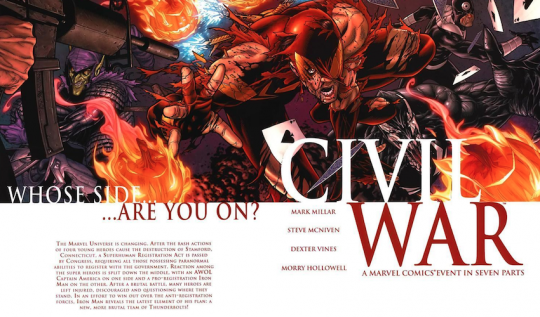Marvel Studios recently announced that Captain America 3 will revolve around the "Civil War" storyline from the comics that ran between 2006 and 2007. The storyline, crafted by Mark Millar—a self-professed liberal who has described Sarah Palin as "terrifying"—was a thinly veiled allegory for the war on terror and a critique of the Patriot Act. The short version of the storyline goes something like this:
A group of untrained and out-of-control superheroes takes on a team of super villains and their battle results in the deaths of some eight or nine hundred people. As a result of this tragedy, the Marvel Universe's version of the CIA/DHS*, SHIELD, pushes for the power to control and train superheroes. They get their way and a law is passed requiring those with superhuman powers to reveal their secret identities and register with, and work for, the government. Those who don't work with the government are imprisoned indefinitely and without trial in the Negative Zone**. Tony Stark (Iron Man) supports the law; Captain America opposes it. After a bunch of fighting, Captain America, realizing he has lost the support of the American people, surrenders. While standing trial for violating the
Patriot ActSuperhero Registration Act, Captain America is killed by a sniper, a martyr in thewar on terrorCivil War.
Remember, this story was conceived and published in the darkest days of the Bush presidency. It's not hard to see the parallels to the arguments against Gitmo and government overreach in the name of keeping people safe. Here's how the New York Times described the series:
Embedded reporters on the front lines of war. The search for weapons of mass destruction. An attack on civil liberties. Sounds like a job for ... Spider-Man? ...
The subsequent Registration Act will divide the heroes into two camps, one led by Captain America, the other by Iron Man. Along the way, Marvel will unveil its version of Guantánamo Bay, enemy combatants, embedded reporters and more. The question at the heart of the series is a fundamental one: "Would you give up your civil liberties to feel safer in the world?"
So I was surprised to find out from Slate's Jamelle Bouie that Civil War is actually better understood as a parable about gun control and Captain America's opposition to Gitmo-like detention and secret lists of enemies was "far-right paranoid fantasy." In his piece, Bouie originally (and mistakenly) said that this comparison makes sense because gun owners are required to register their guns (virtually no Americans are required to register their guns and a national registry is explicitly forbidden by the law) and then used that mistake as a springboard from which to condemn the whole storyline as nutty "libertarian" claptrap. It's worth noting that Bouie isn't the only one to make this mistake: Ezra Klein also said "We make people register when they purchase a gun" in his own denunciation of Captain America's unwillingness to trade liberty for security. Writing in 2014 and 2011, Bouie and Klein, respectively, seem to be much happier to trust the lives of individuals to a beneficent federal government than most progressives were in 2006 and 2007.
I wonder why.
Bouie's post jumped out at me because I'm old enough to remember when things like the Mutant Registration Act were considered the worst kind of bigotry, the struggle for mutant rights first having served as a stand in for the civil rights movement and later as a stand in for the gay rights movement. I spent many hours in my childhood fighting with liberal friends over these proposals. Liberals, invariably, considered it a horrible invasion of privacy at best, and a prelude to genocide, at worst. Discrimination against mutants was unconscionable! They have civil liberties too, you know!*** These arguments were doubly humorous because the same liberals would, moments later, be arguing strenuously in favor of massive new gun control laws. Guns were dangerous and needed to be carefully regulated, while human beings with the powers of gods were, like, totally cool.
Judging by Klein and Bouie, however, it seems that I and those who think like me have won the argument, at least when it comes to comic books. Muties are dangerous and should be tracked by the government. Billionaire weapons merchant and Negative Gitmo Zone advocate Tony Stark was right. It makes perfect sense to restrict the rights of individuals in order to ensure the safety of the populace at large. Glad to have you guys on board. We'll win the War on (Superhuman) Terror eventually!
Update: One thing I want to strenuously agree with Jamelle on: Civil War is horribly written. I had forgotten just how dreadful these in-universe-multi-character crossover stories can be. Reading it yesterday, my (least) favorite moment was the invocation of the cliche "the straw that broke the camel's back" by two different characters just nine pages apart. Ugh.
*Save your quibbles, nerds, I'm trying to dumb this down so the normals can relate to it.
**Remember the Phantom Zone from the Superman movies? Close enough to that for our purposes here.
***The embrace of the comparison of gays to mutants—or, say, the vampires of True Blood—has always struck me as odd. The whole point of the gay rights movement has been to convince straight folks that their gay friends are no danger. Not sure that Magneto and Eric Northman scream "non-threatening," you know? But I digress.
